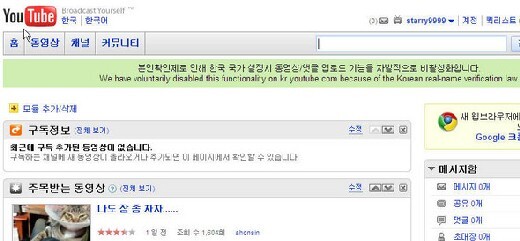hankyoreh
Links to other country sites 다른 나라 사이트 링크
Google refuses South Korean government’s real-name system

Google’s Korea Unit has decided to refuse South Korean government’s Internet regulations. Based on the Law on Internet Address Management, South Korea implements a “real-name” system, which requires a Web site to confirm users’ personal information such as their real names and resident registration numbers when they want to post comments or upload content.
An amendment to the law, South Korea’s Act on the Promotion of Information and Communications Network Utilization and User Protection, went into effect on April 1 expanding the scope of sites subject to the real name registration system from requiring those with 300,000 users per day to websites who have at least 100,000 to comply. Analysts indicate that this would mean that Google, the world’s largest internet company, would be required to comply by restricting South Korean users from uploading video clips or leaving comments on its Korean version of its video-sharing Web site YouTube Korea (kr.youtube.com) unless they use real names.
Google’s Korea unit, however, has found a way around being subjected to the country’s Internet real-name system, voluntarily shutting down some of the Web site’s functions. A notice was available on YouTube Korea Web site’s on April 9 saying, “YouTube has decided to restrict its video upload and comment functions in South Korea.” It also stated, “Because there is no upload function, users won’t be required to confirm their identification.” South Korea is currently the only country that enforces the Internet real-name system. This act by Google is the first time that a company operating in South Korea has refused the real-name system by shutting down its online bulletin board-type functions.
On the same day, Rachel Whetstone, vice president of Global Communications & Public Affairs at Google, offered in a statement posted on Google Korea’s Website the reason why the company has refused to comply to the real-name system. In a statement titled, “Freedom of Expression on the Internet,” Whetstone said, “Google thinks the freedom of expression is most important value to uphold on the internet.” Whetstone continued to say, “We concluded in the end that it is impossible to provide benefits to internet users while observing this country’s law because the law does not fall in line with Google’s principles.”
Analysts suggest even though it has limited some of YouTube Korea’s Web site functionality, Google had no choice but to find a way to refuse compliance with the real-name system in order to maintain its mission. Google maintains a corporate mission of providing universal access to information for all users, and has attempted to apply this to the services it provides worldwide.
Globally, YouTube, the world’s largest video-sharing Web site, allows users to create accounts by simply by giving an ID, password and an E-mail address, and Google gmail users are allowed to use YouTube with their Google IDs. As Google refuses to conform its position on user’s rights to South Korea’s real-name system’s requirements, South Koreans can access YouTube Korea’s site, but cannot post video clips or comments. Google has not restricted South Koreans accessing the site outside of South Korea or foreigners living in South Korea from posting their contents on the YouTube site.
Please direct questions or comments to [englishhani@hani.co.kr]
Editorial・opinion
![[Column] Season 2 of special prosecutor probe may be coming to Korea soon [Column] Season 2 of special prosecutor probe may be coming to Korea soon](https://flexible.img.hani.co.kr/flexible/normal/500/300/imgdb/original/2024/0426/3317141030699447.jpg) [Column] Season 2 of special prosecutor probe may be coming to Korea soon
[Column] Season 2 of special prosecutor probe may be coming to Korea soon![[Column] Park Geun-hye déjà vu in Yoon Suk-yeol [Column] Park Geun-hye déjà vu in Yoon Suk-yeol](https://flexible.img.hani.co.kr/flexible/normal/500/300/imgdb/original/2024/0424/651713945113788.jpg) [Column] Park Geun-hye déjà vu in Yoon Suk-yeol
[Column] Park Geun-hye déjà vu in Yoon Suk-yeol- [Editorial] New weight of N. Korea’s nuclear threats makes dialogue all the more urgent
- [Guest essay] The real reason Korea’s new right wants to dub Rhee a founding father
- [Column] ‘Choson’: Is it time we start referring to N. Korea in its own terms?
- [Editorial] Japan’s rewriting of history with Korea has gone too far
- [Column] The president’s questionable capacity for dialogue
- [Column] Are chaebol firms just pizza pies for families to divvy up as they please?
- [Column] Has Korea, too, crossed the Rubicon on China?
- [Correspondent’s column] In Japan’s alliance with US, echoes of its past alliances with UK
Most viewed articles
- 1‘We must say no’: Seoul defense chief on Korean, USFK involvement in hypothetical Taiwan crisis
- 2AI is catching up with humans at a ‘shocking’ rate
- 3[Column] Season 2 of special prosecutor probe may be coming to Korea soon
- 4Division commander ordered troops to enter raging flood waters before Marine died, survivor says
- 5Korea sees more deaths than births for 52nd consecutive month in February
- 6Is Japan about to snatch control of Line messenger from Korea’s Naver?
- 7[Guest essay] The real reason Korea’s new right wants to dub Rhee a founding father
- 8[Editorial] Korea’s surprise Q1 growth requires objective assessment, not blind fanfare
- 9Is N. Korea threatening to test nukes in response to possible new US-led sanctions body?
- 10One Hyundai worker suffers through 16 piecemeal contracts in 23 months